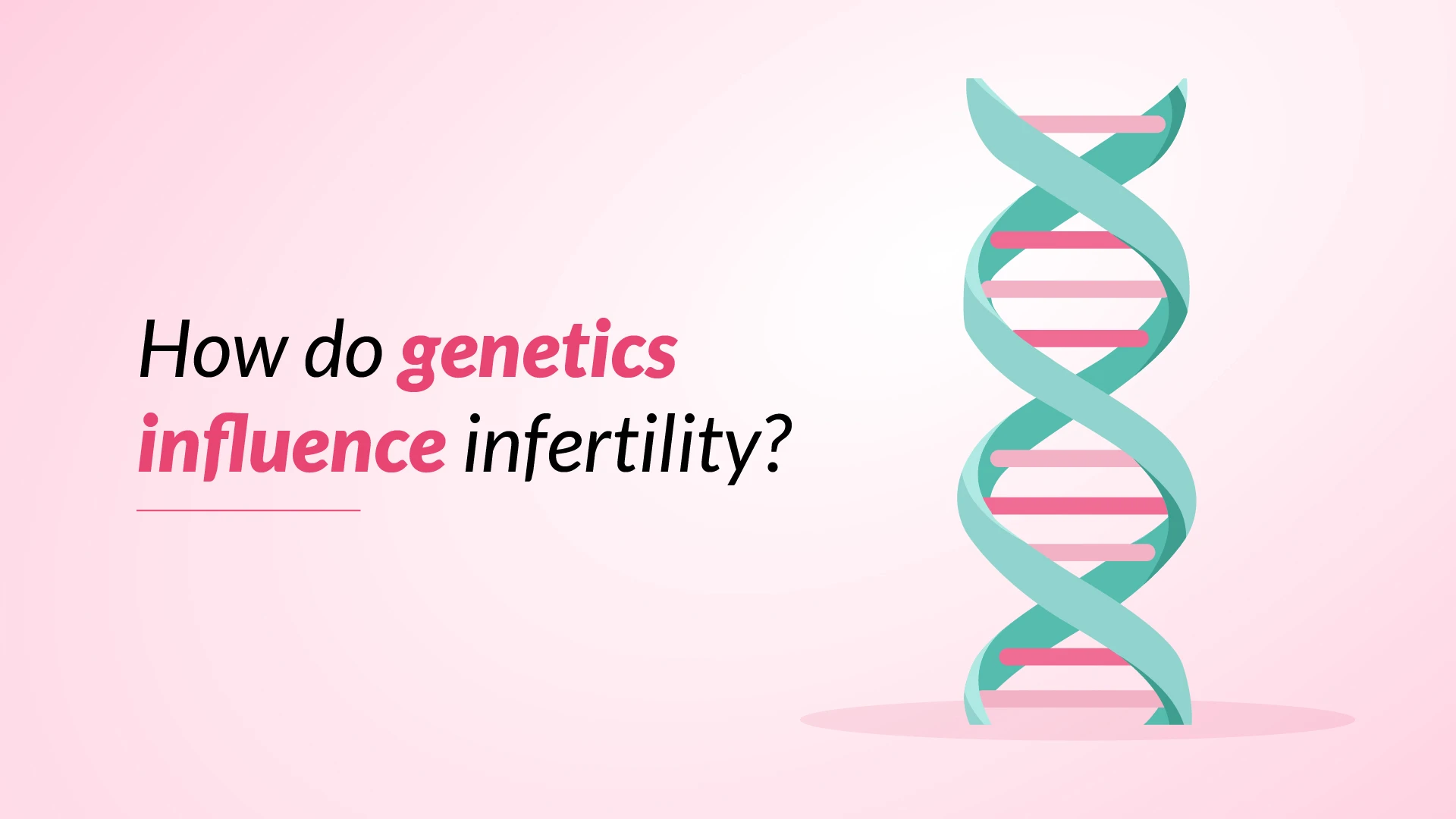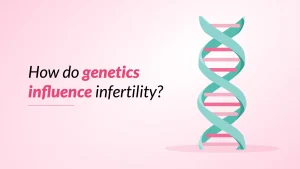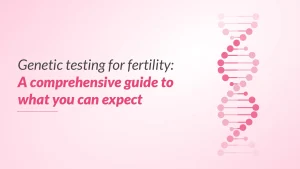Infertility is a complex problem that affects millions of couples worldwide, and genetics play a significant role in determining an individual’s fertility potential. As we delve deeper into the realm of genetic research, we will uncover fascinating insights into how our DNA influences our ability to conceive and carry a pregnancy to term. In this blog, we will try to make you understand the intricate interplay between genetics and infertility, shedding light on the various genetic factors that can contribute to this condition.
Also read: Genetic Testing for Fertility
Genetic Causes of Male Infertility
Genetic Disorders Impacting Sperm Production
Male infertility can originate from a variety of genetic disorders that impair the production or function of sperm. One such condition is Klinefelter syndrome, a chromosomal disorder in which a male child is born with an extra X chromosome (XXY). This syndrome can lead to low testosterone levels, impaired sperm production, and, in some cases, infertility.
Other genetic disorders like Y chromosome microdeletions and cystic fibrosis can also impact sperm production and motility, making conception more challenging.
Related read: Health Implications of XYY Syndrome
Genetic Mutations Affecting Sperm Function
Beyond sperm production, genetic mutations can also influence the functionality of sperm. For instance, mutations in genes responsible for sperm motility, such as the CATSPER1 gene, can impair the ability of sperm to swim effectively, reducing their chances of reaching and fertilising the egg. Additionally, genetic defects in the sperm’s acrosome, a cap-like structure that helps the sperm penetrate the egg, can hinder fertilisation.
Genetic Causes of Female Infertility
Genetic Disorders Affecting Egg Production or Quality
In women, genetic disorders can impact the production and quality of eggs, leading to fertility challenges. One such condition is Turner syndrome. A female is born with a single X chromosome instead of the typical two in this chromosomal disorder. This syndrome can result in ovarian dysfunction, premature ovarian failure, and infertility.
Other genetic disorders like Fragile X syndrome and galactosemia can also affect egg quality and ovarian function, making conception more difficult.
Genetic Mutations Affecting Hormonal Balance
Hormonal imbalances can significantly impact a woman’s fertility, and in some cases, these imbalances can be traced back to genetic mutations. For instance, mutations in the FSH receptor gene can disrupt the signalling pathway responsible for follicle development and ovulation, leading to infertility.
Additionally, genetic defects in the enzymes involved in hormone synthesis or metabolism can also contribute to hormonal imbalances and fertility issues.
Inherited Conditions and Infertility
Certain inherited conditions can also play a role in infertility. For example, polycystic ovary syndrome (PCOS), a condition characterised by hormonal imbalances and irregular ovulation, has a strong genetic component.
Similarly, endometriosis, a condition in which the endometrial tissue grows outside the uterus, has been linked to specific genetic variations, increasing the risk of infertility.
Epigenetics and Infertility
Epigenetics is the science of studying heritable changes in genetic expressions without alterations in the DNA sequence. It is emerging as a crucial factor in fertility. Environmental factors, including diet, stress, and exposure to toxins, can influence epigenetic modifications, potentially impacting fertility. For instance, epigenetic changes in genes involved in folliculogenesis (the process of egg development) or spermatogenesis (the process of sperm production) can contribute to infertility.
Also read: The Impact of Stress on Men’s and Women’s Sexual Health
Types of Genetic Tests for Infertility
Advancements in genetic testing have revolutionised the diagnosis and management of infertility. Some common genetic tests used in the fertility realm include:
- Karyotyping: This test analyses the number and structure of chromosomes, helping to identify chromosomal abnormalities that may contribute to infertility.
- Genetic Carrier Screening: This test screens for genetic mutations that can cause inherited disorders, allowing couples to make informed choices about their reproductive alternatives.
- Preimplantation Genetic Testing (PGT): This advanced technique involves testing embryos created by in vitro fertilisation (IVF) for genetic disorders or any other chromosomal abnormalities before implantation.
- Targeted Gene Sequencing: This test analyses specific genes associated with infertility, providing valuable insights into potential genetic causes.
Also read: Is Male Fertility Higher or Lower Compared to Female Fertility?
Benefits of Genetic Counselling
Genetic counselling plays a crucial part in helping individuals and couples understand the genetic factors contributing to their infertility. Genetic counsellors can provide guidance on genetic testing options, interpret test results, assess the risk of passing on genetic disorders to offspring, and explore available reproductive options. By working closely with a genetic counsellor, couples can make choices about their fertility journey.
Treatment Options for Genetic Infertility
Assisted Reproductive Technologies (ART)
For couples facing genetic infertility, assisted reproductive technologies (ART) like in vitro fertilisation (IVF) and intracytoplasmic sperm injection (ICSI) can offer hope. These techniques can help overcome certain genetic barriers to conception by bypassing specific steps in the fertilisation process. Additionally, preimplantation genetic testing (PGT) can be combined with IVF to screen embryos for genetic disorders before implantation, increasing the possibility of a successful pregnancy.
Preimplantation Genetic Testing (PGT)
Preimplantation genetic testing (PGT) is a powerful tool in the realm of genetic infertility treatment. This technique involves testing embryos created through IVF for specific genetic disorders or chromosomal anomalies before implantation. By selecting only genetically healthy embryos for transfer, PGT can significantly increase the chances of a successful pregnancy while diminishing the risk of passing on genetic disorders to offspring.
Future Prospects in Genetic Treatments
The field of genetic research is rapidly evolving, and new treatment options for genetic infertility are on the horizon. Gene editing technologies like CRISPR-Cas9 hold promise for correcting genetic defects that contribute to infertility, potentially opening up new avenues for treatment. Additionally, innovations in stem cell procedures and regenerative medicine may lead to novel approaches for addressing infertility caused by genetic factors.
Coping with Genetic Infertility
Navigating the challenges of genetic infertility can be emotionally taxing for couples. It is essential to prioritise mental health & seek support from professionals, such as counsellors or support groups, to cope with the emotional toll. Building a strong family and friends support network can also provide invaluable comfort during this journey.
Find Hope and Solutions for Female Infertility and Male Infertility — Explore Our Comprehensive Services
IVF Treatment
IUI Treatment
ICSI Treatment
PICSI Treatment
Fertility Preservation Service
Blastocyst Culture & Transfer Treatment
Conclusion
Genetics play a pivotal role in infertility, influencing various aspects of reproductive health in both men and women. The interplay between genetics and infertility is complex and multifaceted, from chromosomal abnormalities to gene mutations and epigenetic factors. However, advancements in genetic testing and assisted reproductive technologies have empowered couples facing genetic infertility with more options and hope for achieving their dream of parenthood. By understanding the genetic underpinnings of infertility and seeking guidance from professionals, couples can navigate this challenging journey with greater knowledge and support.





























